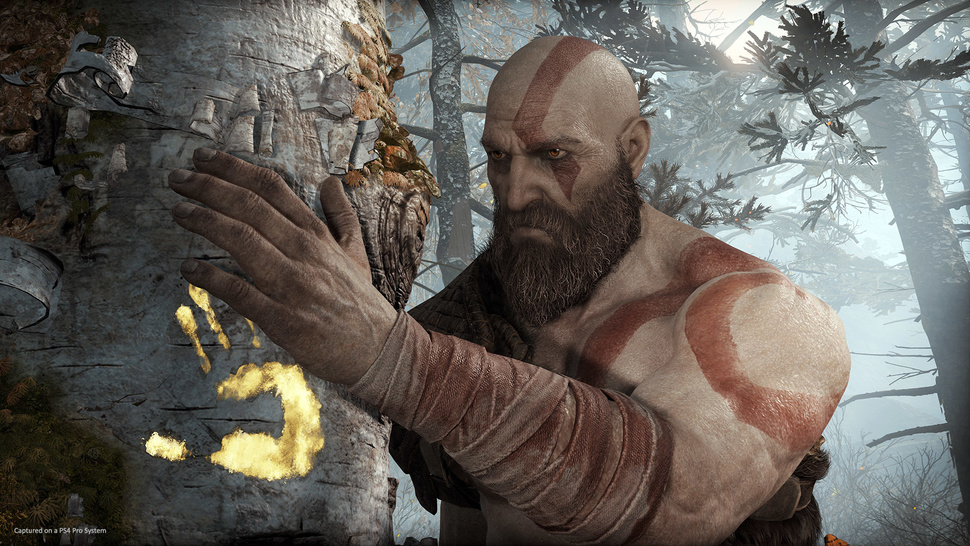I imagine that dedicated God of War fans envy me. My experience with the latest action-packed mythological hack-and-slash was not as an excited follower of the franchise, or straight off of the queues at my local game store. I had never played a God of War game before, and often found my PlayStation 4 to lay dormant for months. So it’s understandable to be envious of my opportunity to be absolutely blown away with surprise by the sheer magnitude of how good 2018’s game of the year was. Once Santa Monica Studios managed to find enough cabinets to store their awards in, they released a documentary following the production of the game titled Raising Kratos, in May 2019. It was an incredibly moving journey, and I learned a lot about the struggles production teams can go through, and the emotional extent of the importance this game has on many people. The game certainly had an impact on me after playing, but it was only after seeing the documentary that I understood the underlying heartbeat of parenthood that can truly have a touching effect on everyone, one way or another. But how did Kratos, yes, Kratos, the Spartan God of War, become the figurehead for one of the most impactful emotional experiences in video game history? The cinematic nature of the game plays a big part. But what about cinema itself?

Early in Raising Kratos, the doc follows the casting for the characters of Kratos, the Greek god from all the previous games, and his newly introduced son, Atreus. Both actors casted had an interestingly flipped perception of the script they were auditioning for. Christopher Judge, the voice actor for Kratos, was initially skeptical. Having initially starred in Stargate SG-1, Judge gingerly looked over the script for God of War. “I called my agent back,” said Judge, “and was like: ‘I thought you said this was a video game?’” Alternatively the actor playing Atreus, Sunny Suljic, was led to believe the opposite. “When I first did the audition, I thought it was a movie” said Sunny in Raising Kratos. He’s not joking, either – the kid genuinely didn’t know it was a game until he got the part. The dialogue and story were so rich and extensive that nobody would believe this was for an action game, let alone the monster-slashing orgy-filled violent omnishambles of this franchise. This is because 2018’s God of War is not like any other in the franchise. In fact, it’s not like any other game, period.
God of War opens to new players with the swaying image of a large tree with a glowing hand-print emanating from its bark, and the striking image of Kratos standing next to it. He has aged, a thick beard growing from his wide jaw. The eyes of the Spartan war god look sullen, determined, fierce, and sad. You press play on the menu, and watch as he lowers onto the tree, pressing his hand against it tentatively. Then, he lifts his huge battle-axe, swinging it deep into the bark of this mystical-looking oak. He swings again. And again. And again. After a mighty crash, the tree falls. Moving around the tree, he hoists up the trunk and carries it on his shoulder effortlessly. And from that point on, the camera stays by Kratos’ shoulder, for the entire game.
"I grew complete empathy with Kratos, because I truly felt like I was him playing the game."
The reason I say that with such drama is warranted. I don’t mean that the game follows the one character the whole time, I mean it stays moving behind Kratos from the time you hit play, to the moment the credits roll. No cut-scenes, no cutaways, no shot/reverse shot conversations. But before we delve into why that rules, let’s talk about the exception to the rule, which is established early. After you bring the fallen tree back home, the camera wanders as it follows Atreus, Kratos’ son, into their frosty home. He approaches the cloaked body of his mother, and shares a prayer with her. We turn to see Kratos, a terrifying figure emerging from shadow. We now understand that this is not just a story following Kratos, it is a story following both a father and his son, the camera shifting between both. Once playing this game I became acutely aware of the dynamic nature of the camera. The game has no traditional cutscenes, it just shifts the camera to whatever action is happening, and then back to Kratos, simply showing us what the protagonist is seeing.

This achieves two main things. The first is immersion. God of War has a limited HUD, and quickly vanishes the second it isn’t needed. Without it, you are left with a full frame of Kratos, usually Atreus by his side, and the breathtaking world built around you. The only HUD left is a thin compass at the top of the screen, which I quickly discovered you can disable in settings, leaving you with a completely unfiltered window into this Norse world. I personally feel that too many numbers, bars and symbols on the screen can retract from the gameplay experience, so this game was a gift to me. When sailing to a new location, walking around a ruined shipwreck or exploring an ancient cave, nothing blocks or interferes with the view of the camera.
The second benefit of this camera style is the connection with character. Games tend to be about controlling a character, taking over their body, using their powers, putting yourself in their shoes (if they wear shoes). The God of War franchise has always been rooted in power-fantasy, a chance to feel like a god, ripping apart huge beasts in a single brutal blow. But in this latest installment, it’s not all about power. Without cutting to anyone else, or any other visual format, the game makes you feel more linked with the character than any other game has before it. I grew complete empathy with Kratos, because I truly felt like I was him playing the game. Every angry grunt, every tender hesitation, every time he fails to embrace his son, it all had an exponentially stronger effect on me. You feel his power, but also his pain, loss, guilt, and fractured relationship with his child. It’s easy to say that this camera makes the experience feel ‘just like a movie’, because that’s a fair comparison. Everything moves so smoothly and is so unfiltered that it can feel like you’re controlling a fantasy movie. However, God of War goes further than that. The consistent nature of the camera means you feel more connected with the protagonist than a movie could ever achieve, for one reason: you control them. Film is a spectator art, something you simply sit back and observe. With gaming, you become the characters in the story, fighting their battles and travelling their journeys. Games have tried to tap into this idea before, primarily within the work of David Cage. Creator of Heavy Rain, Beyond: Two Souls and Detroit: Become Human, Cage is famous for making ‘movie games’: primarily cut-scene based stories you get to interact with by making choices which (usually) affect how the story is played out. These games are met with mixed responses, as often your choices don’t affect the story that much and are simply a guise to make you think you’re part of what is sometimes obviously just an animated film. God of War doesn’t just do cinematic gameplay better, it does it completely differently.
If you wanted to make a game more cinematic, the simple solution is to try and make it like a movie, such as these David Cage games. I think God of War leans into a solution completely new, and dazzlingly exciting. This style of gameplay doesn’t try and make a game more like a movie, because that removes the joy of what a game can achieve. Instead of guiding a character from story cut-scene to story cut-scene, it welds it all together in one fluid experience. This game manages to make a fantastic cinematic experience by actually adding more gameplay than others before it. The only difference being that it keeps this gameplay clean, immersive and consistently beautiful.
But does it feel like a movie’s story? For the main quest, definitely. However, God of War leads you down multiple side quests. For those unfamiliar with games of this style, this is an optional story you can be led down in exchange for in-game rewards. As I found myself nearing the final part of the game, the severed head of Norse god Mimir (long story) tells us that there’s no turning back from here, and if you have anything you want to upgrade or do, now is the time. This is now common in games with multiple quests and options, but what I find interesting about this is that no movie stops just before the final climax, turns to the audience and goes “hey, stuff’s about to get real wild here, so if you want to grab some more drinks or rewind to some scenes that didn’t make sense, go nuts.” The idea is crazy. Games like this are the only style of narrative that are truly experienced how you want to experience them. You can be guided through the story as the creators intend, or you can go and rescue chained dragons for four hours. While I partly thought this halted the momentum of the story, I couldn’t help but feel like I could only blame myself for that. My narrative was completely within my control.
While God of War was showered with awards for its exquisite visuals, voice acting, writing, sound design and level design, I still firmly believe that the way it has invented an entirely new cinematic gameplay experience has been overlooked. It borrows techniques from cinema, while keeping a complete focus on refined and fluid gameplay. And once the credits rolled, I think anyone playing it sat back in awe as we tried to figure out how the hell they made a hack-and-slash God of War game into the most emotionally engaging video game story of the last decade. You know what, I think I’m off to play it again. Try and stop me.

